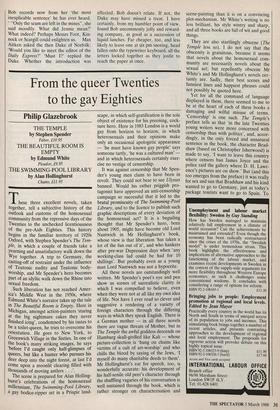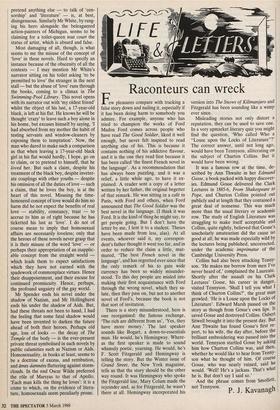From the queer Twenties to the gay Eighties
Philip Glazebrook
THE TEMPLE by Stephen Spender
Faber, £10.95
THE BEAUTIFUL ROOM IS EMPTY by Edmund White
Picador, f9.95
THE SWIMMING-POOL LIBRARY by Alan Hollinghurst
Chatto, £11.95
These three excellent novels, taken together, tell a subjective history of the outlook and customs of the homosexual community from the repressive days of the Twenties to the unchecked licentiousness of the pre-Aids Eighties. This history begins in the familiar territory of 1920s Oxford, with Stephen Spender's The Tem- ple, in which a couple of friends take a yearning and unsatisfactory walk down the Wye together. A trip to Germany, the casting-off of restraint under the influence of Teutonic nudity and Teutonic body- worship, and Mr Spender's hero becomes part of an idyllic walk down the Rhine into sexual freedom.
Such liberation has not reached Amer- ica's Middle West in the 1950s, where Edmund White's narrator takes up the tale in The Beautiful Room is Empty. Here in Michigan, amongst action-painters 'staring at the big nightmare cakes they never finished icing', condemned by his tastes to be a toilet-queen, he tries to overcome his orientation. He goes to New York, to Greenwich Village in the Sixties. In one of the book's many striking images, he says 'before I'd caught only half-glimpses of queers, but like a hunter who pursues his deer deep into the night forest, at last I'd come upon a moonlit clearing filled with thousands of moving antlers . . .'. The scene is prepared for Alan Holling- hurst's celebrations of the homosexual millennium, The Swimming-Pool Library, a gay bodice-ripper set in a Priapic land- scape, in which self-gratification is the sole object of existence for his preening, cock- sure hero. Here in 1983 London is a world gay from horizon to horizon, in which heterosexuals and their opinions make only an occasional apologetic appearance — 'he must have known gay people' says someone tartly, 'he was a cultured man' and in which heterosexuals certainly exer- cise no vestige of censorship. It was against censorship that Mr Spen- der's young men claim to have been in revolt. They could not bear to see Ulysses banned. Would his rather priggish pro- tagonist have approved an anti-censorship campaign so successful that it led to the brutal promiscuity of The Swimming-Pool Library, and to the licence to publish such graphic descriptions of every deviation of the homosexual act? It is a beguiling thought that Mr Spender's hero, born about 1905, might have become old Lord Nantwich in Mr Hollinghurst's book, whose view is that liberation 'has taken a lot of the fun out of it', and who hankers after pre-war Depression days when 'any working-class lad could be had for 10 shillings'. But probably even as a young man Lord Nantwich was not a hypocrite.
All these novels are outstandingly well written. Mr Spender's poet's eye and pen show us scenes of surrealistic clarity in which I was compelled to believe, even when they were not at all like my own idea of life. Nor have I ever read so clever and suggestive a rendering of a variety of foreign characters through the differing ways in which they speak English. There is a German mother — in all three novels there are vague threats of Mother, but in The Temple the awful goddess descends on Hamburg skull-girdled like Kali — whose picture-collection is 'hung on chains like victims of a cult of art-worship' and who chills the blood by saying of the Jews, 'I myself do many charitable deeds to them'. Mr Hollinghurst's ear for speech, too, is wonderfully accurate: his development of his half-senile old peer's character through the shuffling vagaries of his conversation is well sustained through the book, which is rather stronger on characterisation and scene-painting than it is on a convincing plot-mechanism. Mr White's writing is no less brilliant, his style wintry and sharp, and all three books are full of wit and good things.
They are also startlingly obscene (The Temple less so). I do not say that the obscenity is gratuitous, because it seems that novels about the homosexual com- munity are necessarily novels about the sexual act; but repellently obscene Mr White's and Mr Hollinghurst's novels cer- tainly are. Sadly, their best scenes and funniest lines and happiest phrases could not possibly be quoted here. Yet for all the command of language displayed in them, there seemed to me to be at the heart of each of these books a damaging and wilful misuse of terms. `Censorship' is one such. The Temple's preface tells us that 'in the late Twenties young writers were more concerned with censorship than with politics', and, accor- dingly, in the only forced and unnatural sentence in the book, the character Brad- shaw (based on Christopher Isherwood) is made to say, 'I want to leave this country where censors ban James Joyce and the police raid the gallery where D. H. Lawr- ence's pictures are on show.' But (and this too emerges from the preface) it was really for sex and sun that Bradshaw and his kind wanted to go to Germany, just as today's package tourists want to go to Spain. To pretend anything else — to talk of 'cen- sorship' and 'literature' — is, at best, disingenuous. Similarly Mr White, by rang- ing his hero alongside the beleaguered action-painters of Michigan, seems to be claiming for a toilet-queen tout court the status of artist, which is absurd and false.
Most damaging of all, though, is what seems to me the misuse of the concept of `love' in these novels. Hard to specify an instance because of the obscenity of all the contexts — I may mention Mr White's narrator sitting on his toilet asking `to be permitted to love' the stranger in the next stall — but the abuse of 'love' runs through the books, coming to a climax in The .Swimming-Pool Library. This novel opens with its narrator out with 'my oldest friend' whilst the object of his lust, a 17-year-old black, is left at his flat. He knows he will be thought 'crazy' to leave such a boy alone in his home, but excuses himself by saying, 'I had absorbed from my mother the habit of testing servants and window-cleaners by exposing them to temptation'. Now, the man who dared to make such a comparison as that when leaving a 17-year-old black girl in his flat would hardly, I hope, go on to claim, or to pretend to himself, that he loved her. But such a claim, despite his treatment of the black boy, despite inveter- ate couplings with other youths — despite his omission of all the duties of love — such a claim, that he loves the boy, is at the heart of this novel. Misusing the time- honoured concept of love would do him no harm did he not expect the benefits of real love — stability, constancy, trust — to accrue to him as of right because he has ticketted his lust as 'love'. I do not of course mean to imply that homosexual affairs are necessarily loveless; only that the heroes of these novels never grasp that it is their misuse of the word 'love' — or perhaps their appropriation of an inapplic- able concept from the straight world which leads them to expect satisfactions which they have not earned with the spadework of commonplace virtues. Hence their disappointment, and their excuse for continued promiscuity. Hence, perhaps, the profound ungaiety of the gay world.
Mr Spender ends his novel under the shadow of Nazism, and Mr Hollinghurst ends his under the shadow of Aids. But, had these threats not been to hand, I had the feeling that some fatal shadow would have been invented to darken the future ahead of both their heroes. Perhaps old age, loss of looks — the decay of The Temple of the body — is the ever-present private threat symbolised in such novels by public calamities such as Nazism or Aids. Homosexuality, in books at least, seems to be a doctrine of excess, and retribution, and ames damnees fluttering against storm- clouds. In the end Oscar Wilde preferred the role of Marsyas to that of Apollo. `Each man kills the thing he loves': it is a crime to which, on the evidence of litera- ture, homosexuals seem peculiarly prone.



















































 Previous page
Previous page